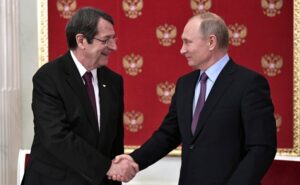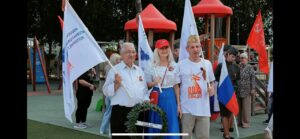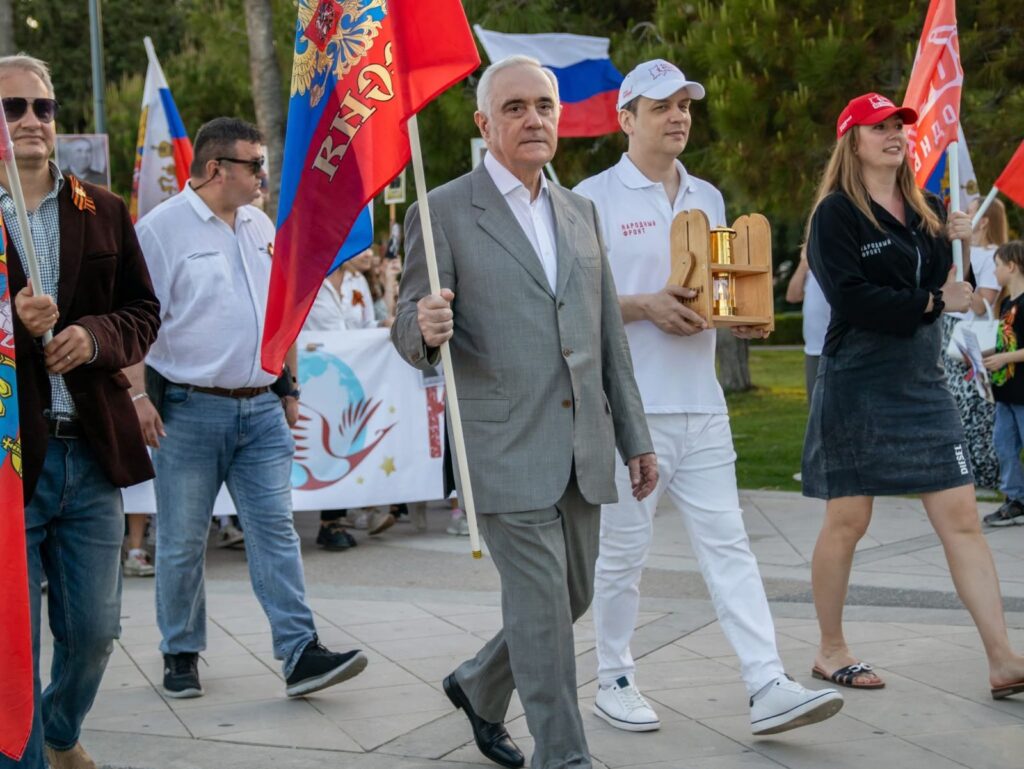Today in Cyprus are represented almost all the agents of influence created by Moscow. The basis for their future network laid in the early 1990s, two people — Yuri Pyanikh and Igor Nasonov.
Yuri Pyanikh had served in Cyprus since 1987 as first, second secretary and economic counselor of the Soviet embassy. In 1992, Pyanikh suddenly left the diplomatic service, turned into a businessman and headed the Cyprus branch of Itera, owned by oligarch Igor Makarov.
Most likely, Pyanikh had been a KGB or GRU officer under diplomatic cover before, and then continued his work under the cover of Itera. In 1995, he established the first Russian public organization in Cyprus, the Association of Russian Businessmen in Cyprus. In his own business activities as an employee of Itera, Piannykh is not noticed, but he is a participant and organizer of mass propaganda and cultural events around the embassy and the Russian House. He is an expert of the intergovernmental Russian-Cypriot commission on economic cooperation, a member and co-founder of the Cypriot branch of the Coordination Council of Russian Compatriots.
Igor Nosonov came to Cyprus in 1996. He is the founder and chairman of the board of directors of the largest Russian newspaper «Vestnik Cyprus», which turned into a media concern. Since 2001 it has been headed by Natalia Kardash. Nosonov is the founder of the Association of Russian-speaking residents of Cyprus «Horizon». When the Coordinating Council of Russian Compatriots (CCRCC) was established in Cyprus in 2008, Nosonov became its first chairman.
From the very beginning, the main task of the CSRCC was to collect information on all Russian-speaking residents of Cyprus, whose files were kept at the embassy. Since 2022, the chairman of CSRRC Cyprus is Dmitry Apraksin, a computer programmer and since 1994 a lecturer in computer science at the University of Nicosia.
There are now several major centers of Russian agent activity in Cyprus.
First, the Russian embassy in Nicosia itself, headed by the ambassador, FSB Lieutenant General Murad Zyazikov. Zyazikov, the immediate past president of Ingushetia, had no prior diplomatic experience. He became Russia’s ambassador to Cyprus in 2022, when Russia’s diplomatic activity was near zero, but Zyazikov’s professional experience as an intelligence officer was in demand. With Zyazikov’s arrival, the agency and propaganda activities of the embassy and the Russian House intensified.
Secondly, the «Russian Center of Science and Culture» (Russkiy Dom) headed by Alina Radchenko, a recent employee of the Russian presidential administration. From here comes all coordination of public propaganda activities in Cyprus. «Russian House» is the official representative of Rossotrudnichestvo in Cyprus.
Rossotrudnichestvo has been under the sanctions of the European Union since 2022, but this has not affected the activities of «Russian House».
A very important place in the structure of Russian agents of influence is occupied by Natalia Kardash, editor-in-chief and owner of the publishing house Vestnik Cyprus.
To control the Russian press abroad, a special organization, the World Association of Russian Press (WARP), was established in Moscow in 1999, which supports and finances Russian-language publications abroad.
In 2014, the WARP Foundation emerged, which performs roughly the same tasks as Russky Mir, but only in the field of the press. Sergey Naryshkin, head of the Russian Foreign Intelligence Service, chairs the foundation’s board of trustees. The publishing house Vestnik Cyprus received grants from various Russian sources, primarily from the Russky Mir Foundation and Pravfond. Both of them found themselves under sanctions in 2022 and have to find workarounds to fund their projects. There are at least two WARP members in Cyprus: Natalia Kardash, head of the publishing house Vestnik Cyprus, and Andrei Avsitidis, publisher of the pro-Kremlin weekly Europa-Cyprus, a breakaway from Vestnik Cyprus.
Kardash is a member of the CSIS and numerous other pro-Russian associations and unions. She is the creator of a «business club» for wealthy Cypriot businessmen, is close to the Cypriot government, was a member of the presidential pool under President Anastasiades, and accompanied him to his meeting with Putin in Moscow.

Cypriot President Nicos Anastasiades at a meeting with Vladimir Putin in the Kremlin, October 2017
Among other things, Kardash is on the board of the European Russian Alliance (ERA), an organization that emerged from a failed attempt by Russian intelligence services to create the first «pan-European» party. The ERA has survived as an international «social movement», which since 2007 has been led by Latvian MEP Tatiana Zhdanok. In the European Parliament Zhdanok is suspected of cooperation with the FSB.
The Orthodox Church occupies a special place in the system of Russian agents. All priests of Russian churches are by definition agents of special services.The ROC-MP in Cyprus has only one parish (it is headed by rector Pavel Povalyaev, who fled Ukraine in 2014), but has close ties with the Cypriot Orthodox Church. Three of the seven Cypriot bishops graduated from seminaries in Moscow and Leningrad. The Russian Orthodox Educational Center in Cyprus, which has been owned by Valery and Natalia Zykovy since 1997, is also of interest from the point of view of connections with the special services. The organization is funded by the Russian Orthodox Church and the Russian World Foundation, and the biographies of its leaders are similar to the career path of agents of the Russian secret services: Zykov studied at the Ryazan Higher Military Command School of Communications, and his wife, an English teacher by profession, served in the Armed Forces in 1980-1985.
Moscow agents have been trying to persistently infiltrate Cypriot political life. In 2017, emigrants from the former Soviet Union created a political organization called Ego O Politis — I am a Citizen. Party leaders Alexei Voloboev and Ivan Mikhnevich regularly visited the embassy, Russian diplomats paid visits to the party office, Voloboev traveled to Moscow where he met with Vyacheslav Volodin, Vladislav Surkov, Leonid Slutsky and other Putin’s politicians. In 2021, the party ceased to exist after exposés in the Cyprus Daily News.
In 2024, a new pro-Kremlin political party Elpis («Hope») was established in Cyprus. The first meeting of the party’s politburo was held on January 9, 2024. The party sees one of its main tasks as the active development of ties with Russia. This was publicly stated by its leader Andreas Teofilaktou.
In January 2024, the chairman of the Cyprus CSRM Dmitri Apraksin announced his intention to run for the European Parliament from the marginal Cypriot party «Active Citizens» (just over a thousand votes in the elections in 2021), relying on the support of Russian voters. Given that in small Cyprus the number of votes cast for even the largest parties does not exceed 20 thousand, the massive and controlled participation of Russian voters in the elections can turn any marginal party into a large and successful one. Buying small parties and movements, both right-wing and left-wing, is an old practice of the Russian secret services around the world.
The Communist Party of Cyprus AKEL, the second largest party in the Cypriot parliament, is considered friendly to Moscow: in 2016, for example, it secured a resolution to lift sanctions against Russia. The draft resolution was discovered in the hacked correspondence of Russian media technologist Sargis Mirzakhanyan.
Some friendly ties with Cypriot politicians date back to the Soviet era — at the expense of the USSR’s university alumni communities.
The Cyprus Association of Graduates of Soviet and Russian Universities, which was founded in 1986 and unites about 2000 people, operates in Cyprus. It works under the wing of the World Association of Graduates of Soviet and Russian Universities, created with the participation of Rossotrudnichestvo. The president of the Cyprus Alumni Association is Anastasios Kouzalis. He is a physicist who graduated from the Patrice Lumumba Institute in 1976 and completed his postgraduate studies there in 1978. In Cyprus, Kouzalis held important positions in the Ministry of Education.
The Society of Friendship and Cultural Relations «Cyprus — Russia» is headed by another graduate of the Patrice Lumumba Institute in 1967, former Minister of Communications and Public Works of Cyprus (2004-2007), Chairman of the Board of the Association of Engineers and Architects of Cyprus Harris Trassou. Kouzalis and Trassou are regular participants in propaganda events organized by the Embassy and the «Russian House».
There are also quite exotic organizations in Cyprus, such as the Cypriot branch of the Imperial Orthodox Palestinian Society (IPPO). The society under this name, which was engaged in organizing pilgrimages to the Holy Land, existed in Russia before the revolution. It was restored in the 1990s under its former name, and in 2007 it was headed by FSB Colonel General Sergei Stepashin, who in different years served as director of the FSB, Minister of Justice, Prime Minister and head of the Accounts Chamber. The official task of the IPPO is the same as before — pilgrimages to Jerusalem, which are out of the question now, of course. The visible part of the IPPO activity is reduced to the organization of twinning between Russian and Cypriot cities, and one can only guess about the invisible part.
There is also a branch of the «International Movement of Russophiles» in Cyprus. It is the organization created by Moscow in 2023 uniting its agents of influence in different countries. In Cyprus, it is headed by Mikis Filaniotis, a member of the Communist Party of Cyprus, an architect who studied in the 1980s in Odessa. Filaniotis is involved in many of Moscow’s propaganda operations in Cyprus.

A separate important topic is Russian schools. There are six of them in Cyprus. Russian schools abroad are, as a rule, bilingual, licensed in their countries and issuing local certificates of education. At the same time, some subjects are taught in Russian, using Russian programs and textbooks. First of all, we are talking about history, literature and geography.In Russia, for about 20 years all school textbooks have been adapted to Putin’s policy and permeated with propaganda. New textbooks are being prepared by special departments under the direction of former Culture Minister Vladimir Medinsky and Foreign Intelligence Service Director Sergei Naryshkin. The same textbooks are also sent to Russian schools abroad. In addition, the schools receive funding and even teachers from Moscow. A paradoxical situation arises. Students graduating from high schools in Western democracies get their understanding of history, politics, and society from Putin’s deliberately false textbooks. And from teachers who teach according to Russian curricula, with all the consequences that this entails. This is how new generations of pro-Putin patriots are raised from the children and grandchildren of Soviet immigrants.
Previous article: How Putin’s agents of influence settled in Cyprus. Part 1

